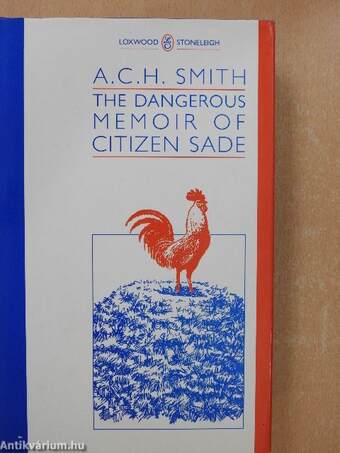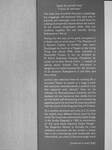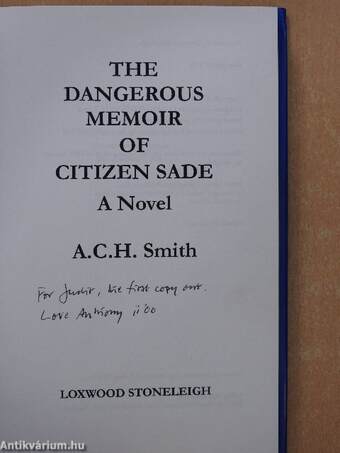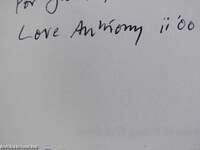1.063.258
kiadvánnyal nyújtjuk Magyarország legnagyobb antikvár könyv-kínálatát

VISSZA
A TETEJÉRE
JAVASLATOKÉszre-
vételek
The dangerous memoir of Citizen sade (dedikált példány)
A Novel
| Kiadó: | Loxwood Stoneleigh |
|---|---|
| Kiadás helye: | |
| Kiadás éve: | |
| Kötés típusa: | Vászon |
| Oldalszám: | 255 oldal |
| Sorozatcím: | |
| Kötetszám: | |
| Nyelv: | Angol |
| Méret: | 22 cm x 14 cm |
| ISBN: | 1-85135-033-0 |
| Megjegyzés: | A. C. H. Smith szerző által dedikált példány. |
naponta értesítjük a beérkező friss
kiadványokról
naponta értesítjük a beérkező friss
kiadványokról
Fülszöveg
"Speak for yourself, Sade." "I never do otherwise."
This Sade (the erstwhile Marquis) is appallingly but engagingly self-obsessed, fully alive only in extremis, and seemingly most himself when he is being incomparably abusive about the author of Les Liaisons dangereuses while they are confined together for ten months during Robespierre's Terror.
Having lost the toss, to his great annoyance it is Sade's task to write down "The Memoirs of a Retired Captain of Artillery who never Discharged so much as a Popgun at any Living Thing and whose Wife must resemble a Mammoth Frozen in Ice, as dictated by M. Pierre Ambroise François Choderlos de Laclos to his Ever Servile Clerk ", instead of talking about himself. This document is dangerous to Laclos because, for the duration of its dictation, Robespierre is still alive, and very active.
Laclos's own selection from his working life is accurate: "Never an assault or a siege, a book that everyone misunderstands, a political coup that... Tovább
Fülszöveg
"Speak for yourself, Sade." "I never do otherwise."
This Sade (the erstwhile Marquis) is appallingly but engagingly self-obsessed, fully alive only in extremis, and seemingly most himself when he is being incomparably abusive about the author of Les Liaisons dangereuses while they are confined together for ten months during Robespierre's Terror.
Having lost the toss, to his great annoyance it is Sade's task to write down "The Memoirs of a Retired Captain of Artillery who never Discharged so much as a Popgun at any Living Thing and whose Wife must resemble a Mammoth Frozen in Ice, as dictated by M. Pierre Ambroise François Choderlos de Laclos to his Ever Servile Clerk ", instead of talking about himself. This document is dangerous to Laclos because, for the duration of its dictation, Robespierre is still alive, and very active.
Laclos's own selection from his working life is accurate: "Never an assault or a siege, a book that everyone misunderstands, a political coup that captured only ridicule." Even so, his wiliness, his Rousseauesque humanity, and his deadpan wit are resources that enable him to survive Sade's self-dramatising and overbearing appetites, just as he survived his close association with the cousin of the King, the Duke of Orleans.
As a novelist, dramatist and critic,A.C.H. Smith has visited many different forms since his first novel, The Crowd, was welcomed by Isabel Quigly in the Sunday Telegraph in 1965 as reminiscent of "the early, black, hilarious Evelyn Waugh". The Dangerous Memoir is, formally, his most ambitious excursion. He has written a fiction that is very entertaining (and incidentally very informative), yet which is disconcertingly more
[continued on back flap]
[continued from front flap]
than an enlightening entertainment.
Without offering anything in the way of an 'apology' for Sade, the author succeeds in representing this monster as a human being; and he contrives to show that the oddly limited main ambition of Laclos's life - to order the firing of a cannon in earnest - makes him a more not a less interesting character.
The reader who begins with some knowledge of the French Revolution (and it certainly helps to have a little) will end the book knowing much more, but with no sense of having received a history lesson. To quote another reviewer of The Crowd, Hilary Corke in The Listener: "One reads, because he writes." Vissza
Témakörök
- Idegennyelv > Idegennyelvű könyvek > Angol > Szépirodalom > Regény, novella, elbeszélés
- Szépirodalom > Regény, novella, elbeszélés > Az író származása szerint > Európa > Nagy-Britannia
- Szépirodalom > Regény, novella, elbeszélés > Tartalom szerint > Történelmi regények > Újkor > Francia forradalom, Napóleon
- Szépirodalom > Regény, novella, elbeszélés > Tartalom szerint > Életrajzi regények > Művészek > Írók, költők
- Szépirodalom > Regény, novella, elbeszélés > Tartalom szerint > Életrajzi regények > Történelmi személyiségek > Külföldiek > Egyéb
- Dedikált, aláírt kiadványok > Idegennyelv > Szerző által > Dedikált kötetek
- Dedikált, aláírt kiadványok > Szépirodalom > Regények, novellák, elbeszélések > Szerző által > Dedikált kötetek
- Idegennyelv > Dedikált, aláírt kötetek > Szerző által > Dedikált kötetek
- Szépirodalom > Dedikált, aláírt kötetek > Szerző által > Dedikált kötetek












